Knowde Enhanced TDS
Identification & Functionality
- Chemical Family
- Polymer Name
- Plastics & Elastomers Functions
- Technologies
- Product Families
Features & Benefits
- Labeling Claims
Applications & Uses
- Markets
- Applications
- Plastics & Elastomers End Uses
- Plastics & Elastomers Processing Methods
Properties
- Flame Rating
- Mechanical Properties
- Physical Properties
- Thermal Properties
- Electrical Properties
- Rheological Calculation Properties
- Test Specimen Production
- Rheological Properties
- Burn Testing Properties
| Value | Units | Test Method / Conditions | |
| Tensile Modulus (dry) | 319000 | psi | ISO 527 |
| Tensile Modulus (cond.) | 247000 | psi | ISO 527 |
| Tensile Strength (dry) | 8410 | psi | ISO 527 |
| Yield Stress (dry) | 8410 | psi | ISO 527 |
| Yield Stress (cond.) | 7690 | psi | ISO 527 |
| Yield Strain (dry) | 4 | % | ISO 527 |
| Yield Strain (cond.) | 16 | % | ISO 527 |
| Stress at 50% Strain (dry) | 5950 | psi | ISO 527 |
| Stress at Break (dry) | 6090 | psi | ISO 527 |
| Nominal Strain at Break (ɛtb, dry) | 115 | % | ISO 527 |
| Nominal Strain at Break (ɛtb, cond.) | min. 50 | % | ISO 527 |
| Typical for the Mat. Nom. Strain at Break (ɛtb) | 92 | % | ISO 527 |
| Charpy Notched Impact Strength (+23°C, dry) | 2.38 | ftlb/in² | ISO 179/1eA |
| Charpy Notched Impact Strength (+23°C, cond.) | 2.85 | ftlb/in² | ISO 179/1eA |
| Charpy Notched Impact Strength (-30°C, dry) | 2.85 | ftlb/in² | ISO 179/1eA |
| Charpy Notched Impact Strength (-30°C, cond.) | 2.85 | ftlb/in² | ISO 179/1eA |
| Flexural Modulus (23°C, dry) | 287000 | psi | ISO 178 |
| Flexural Modulus (23°C, cond.) | 189000 | psi | ISO 178 |
| Flexural Stress at Conv. Deflection (23°C, dry) | 9570 | psi | ISO 178 |
| Flexural Stress at Conv. Deflection (23°C, cond.) | 5800 | psi | ISO 178 |
| Flexural Strength (23°C, dry) | 11300 | psi | ISO 178 |
| Flexural Strength (23°C, cond.) | 7980 | psi | ISO 178 |
| Flexural Strain at Flexural Strength (23°C, dry) | 7 | % | ISO 178 |
| Flexural Strain at Flexural Strength (23°C, cond.) | 9 | % | ISO 178 |
| Puncture - Maximum Force (+23°C, dry) | 985 | Ibf | ISO 6603-2 |
| Puncture - Maximum Force (-30°C, dry) | 1280 | Ibf | ISO 6603-2 |
| Puncture Energy (+23°C, dry) | 469 | in-lb | ISO 6603-2 |
| Puncture Energy (-30°C, dry) | 531 | in-Ib | ISO 6603-2 |
| Value | Units | Test Method / Conditions | |
| Density (dry) | 1.06 | g/cm³ | ISO 1183 |
| Water Absorption (dry) | 2.7 | % | Sim. to 1SO 62 |
| Humidity Absorption (dry) | 1 | % | Sim. to ISO 62 |
| Value | Units | Test Method / Conditions | |
| Melting Temperature (dry) | 419 | °F | ISO 11357-1/-3 |
| Glass Transition Temperature (dry) | 113 | °F | ISO 11357-1/-2 |
| Temperature of Deflection Under Load A (1.80 Mpa, dry) | 149 | °F | ISO 75-1/-2 |
| Temperature of Deflection Under Load B (0.45 Mpa, dry) | 302 | °F | ISO 75-1/-2 |
| Vicat Softening Temperature A (10 N, 50 K/h, dry) | 419 | °F | ISO 306 |
| Vicat Softening Temperature B (50 N, 50 K/h, dry) | 356 | °F | ISO 306 |
| Coefficient of Linear Thermal Expansion (23°C to 55 °C, Parallel, dry) | 7.22e-05 | in/in/°F | ISO 11359-1/-2 |
| Coefficient of Linear Thermal Expansion (23°C to 55 °C, Normal, dry) | 6.67e-05 | in/in/°F | ISO 11359-1/-2 |
| Melting Temperature | 419 | °F | ASTM D 3418 |
| Value | Units | Test Method / Conditions | |
| Volume Resistivity (pV, dry) | min. 1E13 | Ohm*m | IEC 62631-3-1 |
| Volume Resistivity (pV, cond.) | 1000000000000 | Ohm*m | IEC 62631-3-1 |
| Relative Permittivity (100Hz, dry) | 3.8 | — | IEC 62631-2-1 |
| Relative Permittivity (100Hz, cond.) | 4.5 | — | IEC 62631-2-1 |
| Relative Permittivity (1MHz, dry) | 3.2 | — | IEC 62631-2-1 |
| Relative Permittivity (1MHz, cond.) | 441 | — | IEC 62631-2-1 |
| Dissipation Factor (100Hz, dry) | 240 | E-4 | IEC 62631-2-1 |
| Dissipation Factor (100Hz, cond.) | 590 | E-4 | IEC 62631-2-1 |
| Dissipation Factor (1Mhz, dry) | 290 | E-4 | IEC 62631-2-1 |
| Dissipation Factor (1Mhz, cond.) | 510 | E-4 | IEC 62631-2-1 |
| Electric Strength (AC, S20/S20, t. 1 mm, dry) | 711 | kV/in | IEC 60243-1 |
| Electric Strength (AC, S20/S20, t. 1 mm, cond.) | 686 | kV/in | IEC 60243-1 |
| Electric Strength (AC, S20/P50, dry) | 711 | V/ mil | Sim. to IEC 60243-1 |
| Value | Units | Test Method / Conditions | |
| Minimum Mold Temperature | 86 | °F | — |
| Maximum Mold Temperature | 212 | °F | — |
| Minimum Melt Temperature | 446 | °F | — |
| Maximum Melt Temperature | 518 | °F | — |
| Value | Units | Test Method / Conditions | |
| Injection Molding - Melt Temperature | 482 | °F | ISO 294 |
| Injection Molding - Mold Temperature | 176 | °F | ISO 294 |
| Injection Molding - Injection Velocity | 7.87 | in/s | ISO 294 |
| Injection Molding - Pressure at Hold | 10200 | psi | ISO 294 |
| Value | Units | Test Method / Conditions | |
| Melt Volume Flow Rate (dry, at 464°F, 1lb) | 75 | cm³/10min | ISO 1133 |
| Molding Shrinkage (Parallel, dry) | 1.3 | % | ISO 294-4, 2577 |
| Molding Shrinkage (Normal, dry) | 1.4 | % | ISO 294-4, 2577 |
| Mold Temperature (dry) | 176 | °F | — |
| Melt Temperature (dry) | 482 | °F | — |
| Value | Units | Test Method / Conditions | |
| Burning Behavior (at 1.5 mm Nominal Thickness) (dry) | HB | class | IEC 60695-11-10 |
| Burning Behavior (at Thickness 0.1260 in.) (dry) | HB | class | IEC 60695-11-10 |
Technical Details & Test Data
- Viscosity-Shear Rate HKR

- Shearstress-Shear Rate HKR

- Dynamic Shear Modulus-Temperature (Dry)
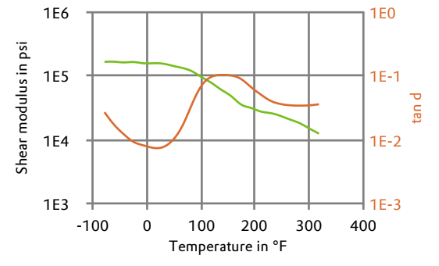
- Stress-Strain (Dry)
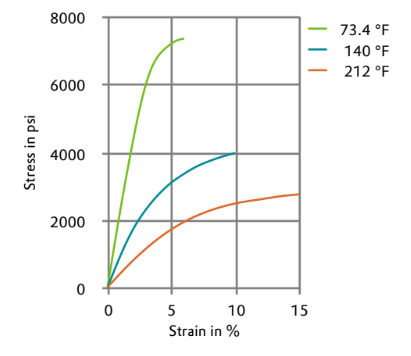
- Secant Modulus-Strain (Dry)
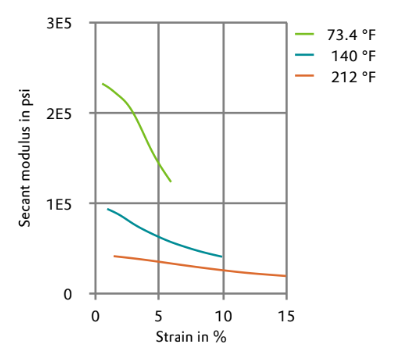
- Stress-Strain (Isochronous) 73°F (Cond.)
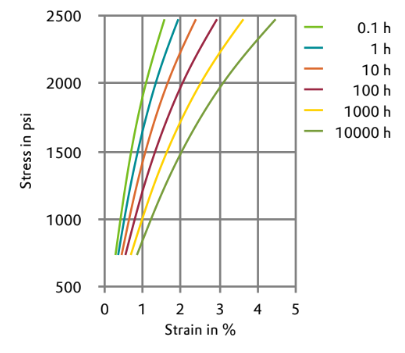
- Creep Modulus-Time 73°F (Cond.)
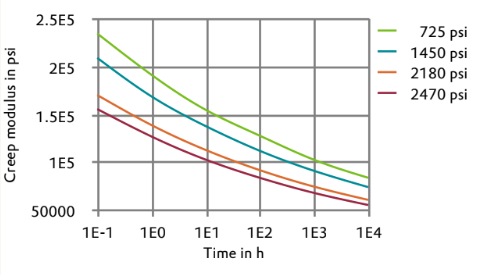
- Specific Volume-Temperature (pvT)
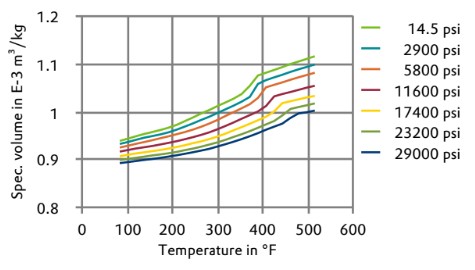
Packaging & Availability
- Packaging Type
- Packaging Information
VESTAMID® D16 is supplied as cylindrical granules in moisture-proof polyethylene containers ready for processing.

